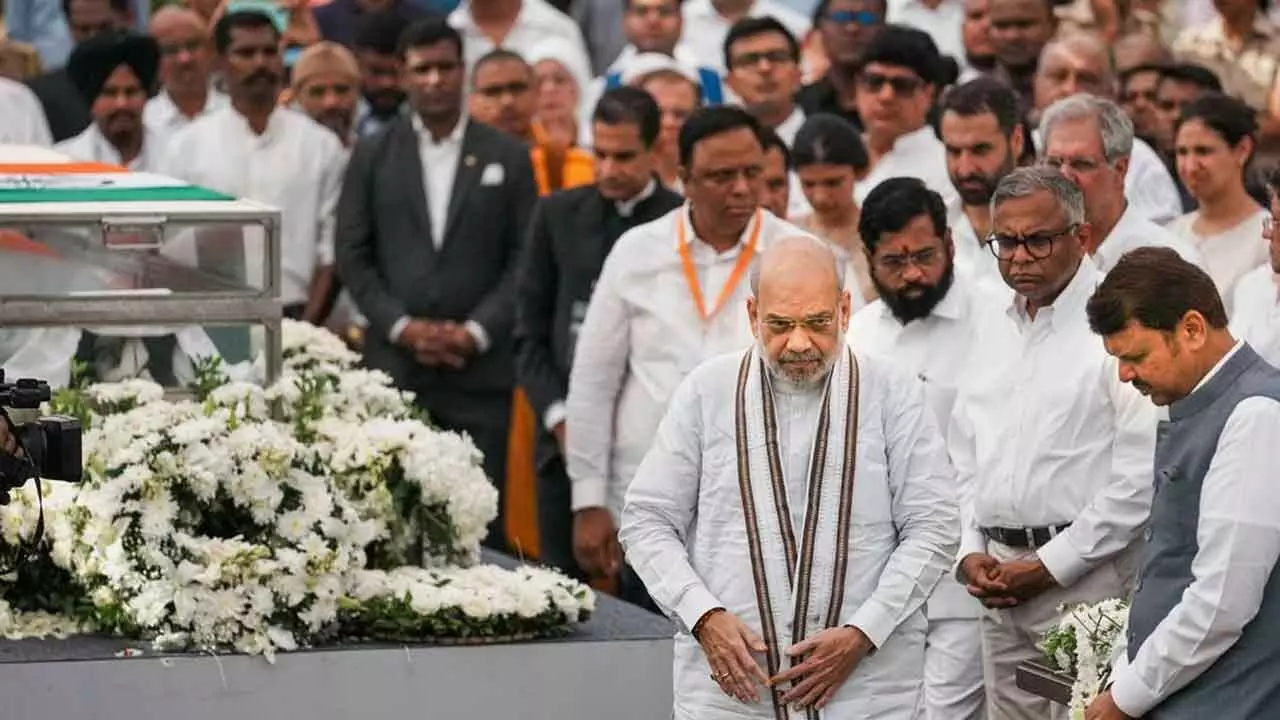Farewell To Ratan Tata, Corporate Saint
The 86-yr-old doyen of industry, who passed away on Wednesday night in Mumbai, put India Inc on global map; he managed 30 cos in 100 countries, but never appeared on any list of billionaires
Union Home Minister Amit Shah after paying his last respects to business leader Ratan Tata at NCPA lawns, in Mumbai on Thursday. Former Tata Group Chairman Ratan Tata, 86, died at a Mumbai hospital Wednesday night

Doyen of global industry led Tata Group’s top line to $100 bn from $4 bn under his regime; He steered Tata business, which began as a small textile and trading firm in 1868, into a global powerhouse
Mumbai: The final rites of renowned industrialist and philanthropist Ratan Tata were performed with full state honours at a central Mumbai crematorium on Thursday evening. The Mumbai police paid tribute to Tata with a gun salute. The industry titan’s family members, including the half-brother Noel Tata, and top executives from the Tata Group like chairman N Chandrasekaran, were present at the crematorium in Worli. Union Home Minister Amit Shah, his cabinet colleague Piyush Goyal, Maharashtra Chief Minister Eknath Shinde, his deputy Devendra Fadnavis, Congress leader and former CM Sushilkumar Shinde, among others, were also present. The last rites were performed as per the Parsi tradition, one of the priests present at the crematorium said. After the funeral, there will be three more days of rituals which will be conducted at the late industrialist’s bungalow in Colaba, south Mumbai, he said. Tata (86), a Padma Vibhushan recipient, died after a brief illness at a city hospital late on Wednesday night.
As chairman for more than two decades, he took the staid Tata Group global, clinching eye-catching deals, including iconic British assets like steelmaker Corus, luxury carmaker Jaguar Land Rover and the world’s second-largest tea company Tetley. Owning less than 1 per cent of the group that bears his family name, Tata Group under him grew over 70 times, ending the fiscal year in March 2024 with $165 billion in revenue. Today, the group makes everything from coffee to cars, salt to software, and steel to power, runs airlines and introduced India’s first super app. It recently forayed into chip making and is planning an iPhone assembly plant. The affable Tata never brought the spotlight on himself. He never married although he came close to marrying on four occasions, including one when he was in the US. His death has left a vacuum at the top post of Tata Trusts, which owns 66 per cent of the group’s holding company, Tata Sons.
Noel Tata, half-brother of Ratan Tata, is seen as a strong contender to succeed. Noel is vice chairman of Tata Steel and watch company Titan. His mother Simone Tata, a French-Swiss Catholic, who is Ratan Tata’s stepmother, is currently chairman of Trent, Voltas, Tata Investment Corporation and Tata International. Ratan Tata’s younger brother Jimmy is not involved in the family business and lives in a modest two-bedroom apartment in Colaba. Born in a traditional Parsi family in 1937, Ratan Tata was brought up by his grandmother after his parents, Naval and Sooni Tata, divorced when he was 10. A shy student, who was afraid of public speaking, learned piano and played cricket before going to Cornell University in the US to study architecture and structural engineering. He wanted to settle down in California but the poor health of his grandmother prompted him to return to India in 1962. Though he had a job offer from IBM, the then-chairman of Tata Sons, Jehangir Ratanji Dadabhoy Tata or JRD, persuaded him to instead work for the group.
He initially worked on the shop floor, gaining experience in a number of Tata Group businesses before joining management in 1971 when he was director in charge of one of the group firms, the National Radio and Electronics Co. He became chairman of Tata Industries a decade later and in 1991, took over as the chairman of the Tata Group from his uncle, JRD, who had been in charge for more than half a century. This was the year when India opened its economy and Tata soon turned the group - which mostly was focused on India after starting as a small textile and trading firm in 1868 - into a global powerhouse with operations stretching from salt to steel, cars to software, power plants and airlines.
He was the chairman of Tata Sons, the group’s main holding company, for more than two decades during which the conglomerate aggressively sought to expand, acquiring London-based Tetley Tea in 2000 for $431.3 million, buying truck-manufacturing operations of South Korea’s Daewoo Motors for $102 million in 2004, paying $11.3 billion to take over Anglo-Dutch steel manufacturer Corus Group and spending $2.3 billion to purchase elite British car brands Jaguar and Land Rover from the Ford Motor Company.
Time Line
♦ Born in a Parsi family in 1937
♦ Ratan Tata became Chairman of Tata Sons in 1991
♦ Tata’s philanthropic efforts gained new momentum
♦ In Dec 2012, he ceded control of Tata Sons to Cyrus Mistry
♦ Subsequently, became interim chairman in Oct 2016, as Mistry was ousted
♦ Post-retirement, he invested in new-age, tech-driven startups
♦ He invested in over 30 startups

